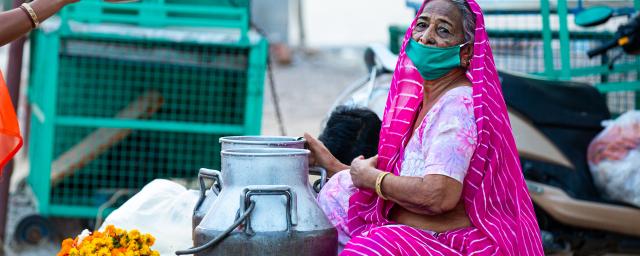
An old woman wearing a protective mask, selling food on road due to lockdown in Jodhpur, Rajashtan, India. 30 March 2020. Photo: Shutterstock
As the 6-month mark of the COVID-19 pandemic approaches, close to a million people have lost their lives. The economic fallout has been equally devastating, with 400 million jobs lost and a half a billion people are expected to be pushed into poverty. But not everyone is losing out.
According to new Oxfam research, 32 of the world’s largest companies stand to see their profits jump by $109 billion more in 2020. Indeed, the pandemic has laid bare for all to see a rigged economic model that has allowed the world’s largest corporations to make billions of dollars at the expense of low wage workers, funneling profits to shareholders, a small group of largely men.
Worse yet, the inequality crisis is crystalizing, as some corporations have put profits before workers’ safety, pushed costs down the supply chain, and used their political influence to shape policy to their advantage.
It’s not really something new. In fact, over the past few decades, a majority of corporations have increased their use of a number of tools that drive inequality. And despite entering an economic crisis that has not been seen since The Great Depression, they have not ceased to use such tools.
Here are five ways in which corporations are cashing in on the back of the new coronavirus:
1. Flexing their lobbying muscles
In the US, COVID-19 spurred a near-record first-quarter lobbying spend by industry of $903 million. More than 3,000 lobbying clients (the vast majority representing the interests of companies) attempted to shape the contents of the stimulus package in their favor.
Companies successfully lobbied against the closure of their operations despite significant health risks to their workers. Examples include food manufacturers in the US, apparel factories in Mexico and mining operators in several countries.
Companies successfully lobbied for tax benefits. Thanks to aggressive lobbying tactics the oil and gas industry disproportionately benefited from over $100 billion in tax cuts in the US. In India, companies have lobbied to pause taxes on stock buybacks. Mining companies have lobbied for tax holidays in several countries, while airlines have lobbied to roll back environmental taxes.
2. Shifting costs and risks
Ten of the world’s largest apparel brands paid 74% of their profits (a total of $21 billion) to their shareholders in dividends and stock buybacks in 2019. This year millions of apparel workers have lost their jobs because companies cancelled orders and refused to pay their suppliers.
In West Africa, cocoa farmers are feeling the impacts of COVID-19 as the decline in global demand for cocoa is channeled to farmers through buyers’ global supply chains in the form of lower prices. Child labor on cocoa farms is also on the rise due the economic downturn impacting cocoa farmers and the lower availability of adult labor due to lockdowns.
In Thailand, workers in global seafood supply chains have been left alone to deal with the impacts of COVID-19, including obtaining protective gear and declining wages.

Seafood workers in Thailand. Photo: Vinai Dithajohn/Oxfam
3. Avoiding taxes
Several companies with a history of tax avoidance are being bailed out with taxpayer money. An analysis by Reuters of a subset of companies bailed out under the Paycheck Protection Program found that more than 40% of recipients receiving $4 million or more from the program did not pay any corporate income taxes for the last year.
Large companies with thousands of employees took advantage of lax controls to get more than $350 million from a US government relief fund aimed to help small businesses through the crisis.
Companies receiving 29% of the total loans from the UK government’s Covid Corporate Financing Facility (including Baker Hughes, Chanel, CNH Industrial and Easyjet) are linked to well-known tax havens.
4. Prioritizing payouts
Several major US companies stuck to shareholder payout plans despite requesting government bailouts or laying off employees. For instance, Royal Caribbean, Halliburton, General Motors and McDonald’s all laid off staff or cut hours and salaries while maintaining payouts. Caterpillar, Levi Strauss, Stanley Black & Decker, Steelcase and World Wrestling Entertainment did the same, while paying more than $700 million combined in cash dividends.
Nigeria's largest cement company, Dangote Cement, allegedly fired more than 3,000 staff without prior notice or due process while the company is still expected to pay 136% of its profits to shareholders in FY2020.
German automotive company BMW paid more than €1.6 billion in dividends despite requesting subsidies from the German government and relying on state-backed furlough schemes.
5. Putting workers at risk
Food retailers have faced a backlash from employees for insufficient health and safety protection. McDonald’s has faced a class action lawsuit accusing it of failing to adopt US government safety guidance on COVID-19 and endangering employees and their families.
Migrant workers in Qatar hired to build stadiums and infrastructure for the FIFA World Cup 2022 have suffered from salary delays and layoffs, in addition to overcrowded living conditions, limited health precautions and no sick pay.
Food delivery companies have been accused of not providing adequate protection for their drivers, who have been left vulnerable to the pandemic as most have limited access to unemployment benefits, health insurance or sick leave. For instance, in the UK, Deliveroo has drawn criticism for inadequate PPE provision and income support for riders.